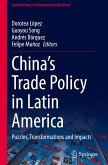As economic populism and protectionism increasingly threatens the global trade order, this book examines the behavior of World Trade Organization (WTO) members at the judicial arm of the WTO-the dispute settlement mechanism (DSM). The author explores why and when governments cooperate at the WTO and comply with the ruling of its panels, focusing on how the growth of global value chains through the internationalization of trade and production has increased the importance of both trade liberalization and supra-national governance and policy-making. Finding that domestic organized interests-i.e. firms and sectors-mobilize and lobby national governments to change their domestic policies to better harmonize with their international trade commitments, the author outlines how the time it takes to comply with adverse WTO rulings is shorter when the potential domestic costs of non-compliance outweigh protectionist interests. The author's innovative research design highlights the conditions under which the WTO can preserve the rules of international trade and support a more open, global economy.
Bitte wählen Sie Ihr Anliegen aus.
Rechnungen
Retourenschein anfordern
Bestellstatus
Storno








